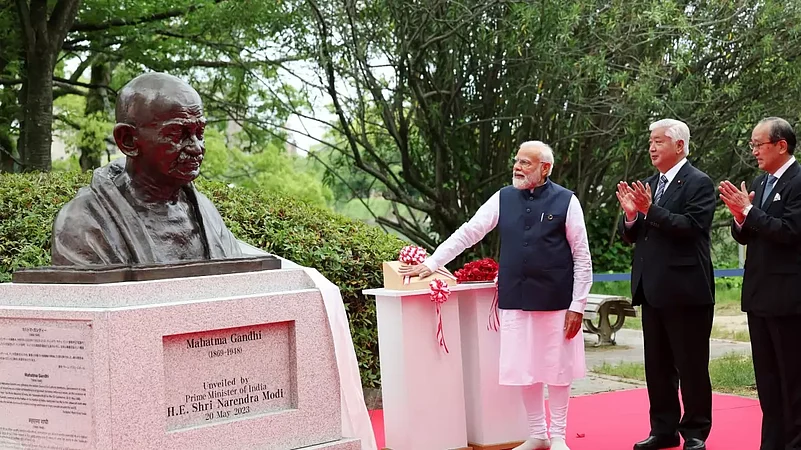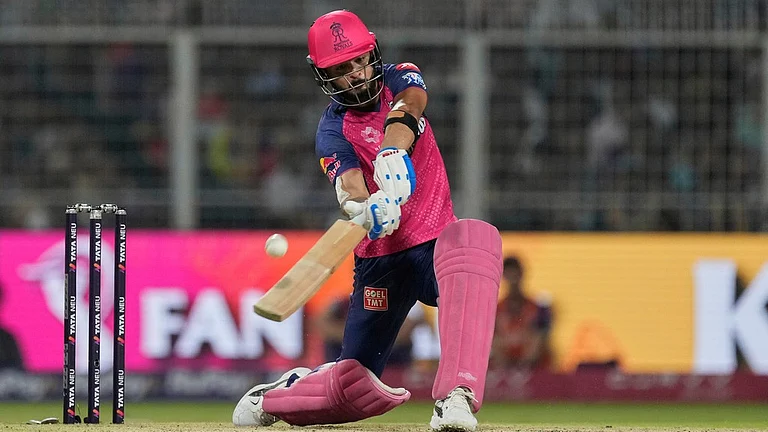Mahatma Gandhi is not the most popular figure within the wider Sangh Parivar ecosystem. Many top Rashtriya Swayamsevak Sangh (RSS) ideologues blame him for the Partition of India along with Pandit Jawaharlal Nehru. His acceptance of Muslims as an integral part of the Indian nation also irked some. Though Gandhi was a staunch Hindu, his Hinduism, and his concept of nationhood were not acceptable to the RSS leader Madhav Sadashiv Golwalkar.
In recent years, Gandhi’s assassin Nathuram Godse has been publicly praised by Bharatiya Janata Party’s (BJP) second-rung leaders, including Union minister Giriraj Singh and firebrand MP Sadhvi Pragya Singh.
None of this, however, has stopped Prime Minister Narendra Modi from invoking Gandhi regularly on the world stage. As India’s most recognisable name and one of the world’s most admired persons, Gandhi has been used as a symbol by successive Prime Ministers of India to project his ideas of pacifism as a political weapon. Modi has often evoked Gandhi in his speeches abroad despite the fact that his party may not be on the same page. Gandhi is too big an icon to be abandoned.
Modi has delivered several speeches on Gandhi’s life and legacy.
“Gandhiji was Indian, but he belonged not just to India. Today, this platform is a living example of this. The people whom Gandhi ji never met were also greatly influenced by his life. Whether it was Martin Luther King Jr or Nelson Mandela, the basis of their ideas was Mahatma Gandhi and Gandhi ji’s vision,” said Modi in 2019 when the United Nations (UN) marked 150 years of Gandhi’s birth.
He further said, “Gandhi ji never tried to make an impact in his life, but his life became the cause of inspiration. Today, we live in the era of ‘how to impress’ but Gandhi ji’s vision was ‘how to inspire’. Friends, this commitment to principles drew Gandhi’s attention toward seven distortions that everyone should be aware of and all these seven things are still relevant and will be relevant in the times to come.
“Those seven principles are: wealth without work, pleasure without consciousness, knowledge without character, business without ethics, science without humanity, religion without sacrifice, and politics without principle.”
Gandhi’s brutal assassination has given him the added glow of a martyr for the cause of peace and religious harmony. Gandhi, the prophet of non-violence, introduced satyagraha as a powerful weapon in political movements worldwide. He was able to take on the mighty British Empire without resorting to violence, though the irony is that the Partition led to one of the worst blood-letting in recent history.
Gandhi’s pacifist ideas not only captured the imagination of the Indian masses but reverberated across the world. In a world where might is right, Gandhi introduced a powerful idea of morality and showed how a people can rise without violence to vanquish a mighty empire. From Martin Luther King Jr, the American civil rights leader, to South Africa’s anti-apartheid leader Nelson Mandela, all looked up to Gandhi for inspiration and publicly acknowledged that they had tried to take a leaf from the Mahatma’s book of non-violent resistance. Across the world from the African continent to Europe and Asia, leaders have been inspired by Gandhi’s satyagraha as a weapon against oppression.
American academic, non-violence educator, mentor, meditator, and peace activist Michael N Nagler describes Satyagraha as “clinging to the truth that we are all one under the skin, that there is no such thing as a ‘win/lose’ confrontation because all our important interests are the same, that consciously or not every single person wants unity and peace with every other.”
Satyagraha means “truth force”, “soul force”, or as Martin Luther King Jr would call it, “love in action”. Satyagraha has often been defined as the philosophy of non-violent resistance.
How relevant is Gandhi today? Some would say more than ever before considering that in the modern inter-connected world, war affects everyone. The Ukraine War is a prime example of how grain, fertilisers, and gas supplies have affected people across the world. Now more than ever before, global leaders need to hear Gandhi’s words of pacifism and non-violence that can be more powerful than guns and tanks.
Asked about the relevance of Gandhi, former diplomat Gurjit Singh says, “I don’t know about relevance, but like we got International Day of Yoga in 2014, and, earlier in 2005, we had got the UN to pass October 2 as International Day of Non-Violence. Embassies marked it with gusto. I don’t know the current status, but the message of peace and non-violence was always appreciated by the international community.”
Gandhi’s ahimsa and satyagraha play well into Modi’s projection of India as an ancient land of sages and thinkers. This peaceful non-violent country has much to offer to the world. It is a spiritual land from where three great religions —Buddhism, Jainism, and Hinduism— were born.
Gandhi-related activities are often a part of Modi’s programmes abroad. In a visit to Rome in 2021, he tweeted: “In Rome, I had the opportunity to pay homage to Mahatma Gandhi, whose ideals give courage and inspiration to millions globally.”
Again, in Hiroshima in July, where he was to attend the G7 outreach meeting, Modi unveiled a bust of Gandhi. Hiroshima, the place where the United States dropped an atomic bomb just before World War II ended, was a fit place to have a bust for the man who preached non-violence all his life.
In June this year, while addressing the joint session of the US Congress, Modi spoke of Gandhi. The G20 Summit in Delhi ended with a visit to Raj Ghat by world leaders attending the summit.
Where Modi stands on the debate on Gandhi is not known. It is also a fact that there is a thundering silence over efforts by some BJP leaders to praise Godse, none of them have been publicly rebuked by either the PM or BJP brass. But unlike Nehru, Gandhi’s international status ensures that he is not relegated to the dustbin of history.



























